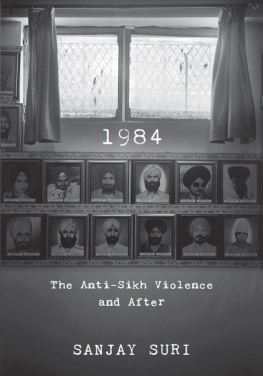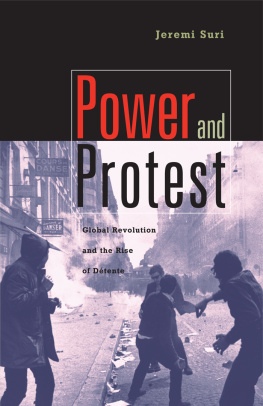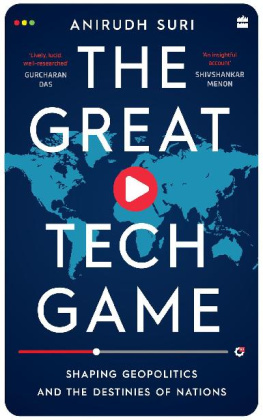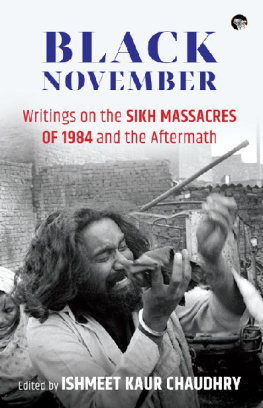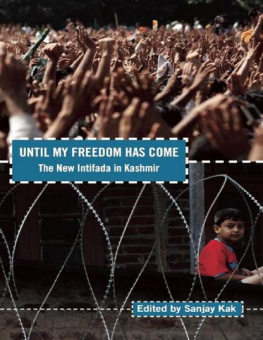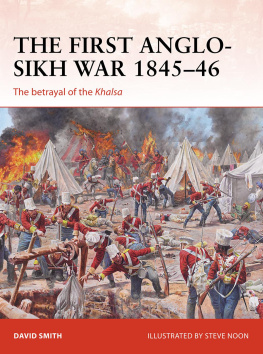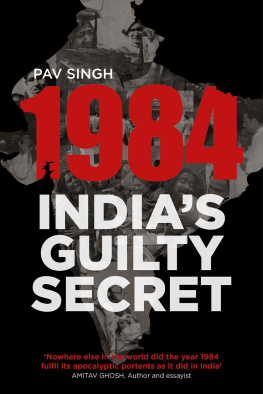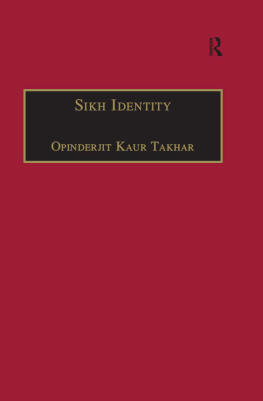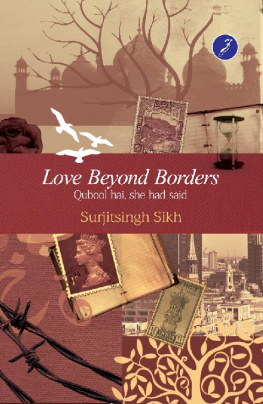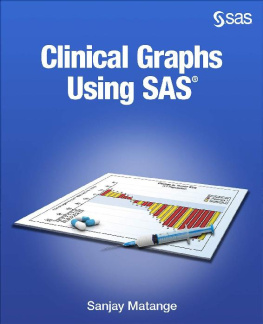Sanjay Suri - 1984: The Anti-Sikh Riots and After
Here you can read online Sanjay Suri - 1984: The Anti-Sikh Riots and After full text of the book (entire story) in english for free. Download pdf and epub, get meaning, cover and reviews about this ebook. year: 2015, publisher: HarperCollins Publishers India, genre: Detective and thriller. Description of the work, (preface) as well as reviews are available. Best literature library LitArk.com created for fans of good reading and offers a wide selection of genres:
Romance novel
Science fiction
Adventure
Detective
Science
History
Home and family
Prose
Art
Politics
Computer
Non-fiction
Religion
Business
Children
Humor
Choose a favorite category and find really read worthwhile books. Enjoy immersion in the world of imagination, feel the emotions of the characters or learn something new for yourself, make an fascinating discovery.
- Book:1984: The Anti-Sikh Riots and After
- Author:
- Publisher:HarperCollins Publishers India
- Genre:
- Year:2015
- Rating:3 / 5
- Favourites:Add to favourites
- Your mark:
- 60
- 1
- 2
- 3
- 4
- 5
1984: The Anti-Sikh Riots and After: summary, description and annotation
We offer to read an annotation, description, summary or preface (depends on what the author of the book "1984: The Anti-Sikh Riots and After" wrote himself). If you haven't found the necessary information about the book — write in the comments, we will try to find it.
1984: The Anti-Sikh Riots and After — read online for free the complete book (whole text) full work
Below is the text of the book, divided by pages. System saving the place of the last page read, allows you to conveniently read the book "1984: The Anti-Sikh Riots and After" online for free, without having to search again every time where you left off. Put a bookmark, and you can go to the page where you finished reading at any time.
Font size:
Interval:
Bookmark:


| 1. |
| 2. |
| 3. |
| 4. |
| 5. |
| 6. |
| 7. |
| 8. |
| 9. |
| 10. |
| 11. |
| 12. |
| 13. |
| 14. |
This book got going, suddenly one afternoon in 2014, in the course of a chat with my friend and colleague Sagarika Ghose. Why havent you written a book on 1984 yet? she asked. I didnt have an answer as good as the question.
We spoke when 1984 was back in the air. Rahul Gandhi had just given an interview in which he duly denied that his party, or the Congress-I as it was once called (after his grandmother and former prime minister, Indira Gandhi) had a hand in the killings of the Sikhs in Delhi following her assassination in 1984. Rahul also insisted that his father, Rajiv Gandhi and his newly formed government then had done all they could to stop the violence. The usual volley of allegations and counter-allegations followed.
I thought I had something to contribute to this debate, away from the usual blame game. It would be in the form of a record of what I had seen and reported through 1984, a resurrected diary of sorts.
I had reported on the violence that had erupted in Delhi as a crime reporter with The Indian Express newspaper. Later, I submitted affidavits based on my eyewitness accounts before two inquiry commissions, headed by Justices Ranganath Misra and G.T. Nanavati.
This book brings in all that but seeks to do more than staple the earlier submissions together. It brings three offerings.
One, I include here detailed interviews with critically important police officers who were at the forefront of dealing with the violence in 1984. For this, a delay of thirty years might not have been bad at all. These officers are now retired, and could speak far more freely than they ever could before. What they do say now is telling.
Second, I place my experiences and encounters within the context of the law and required legal procedures as they stood then, and still do. The debate over 1984 has continued far too long without a close enough reference to the law.
Third, I bring into this account my own experience of reporting and witnessing the events of 1984, in Punjab as well as in Delhi. This I could never do before as a reporter tied only to newsy facts. This, now, is an account of the person, such as I am, running into those events, such as they were.
Those scenes are before me like it all happened yesterday, though I am not always able to correlate them to a time, or even date; I offer dates only to the best of my recollection. I could not re-check dates because I kept no clippings, unwisely, and could not find back issues at The Indian Express. They said at the library that the files of that period in 1984 have gone missing. I could not find them at the governments newspaper library at Teen Murti Bhavan in Delhi either.
The following pages include much that is historical but make no claim to be the history of those days. They arise from what I directly saw and personally understood. I believe that the account is not historical also because it adds up to a case for steps that are still possible to takejust about.
Finally, this sharing is made possible by the guidance of Krishan Chopra at HarperCollins, and the astute reading by the editor, Somak Ghoshal.
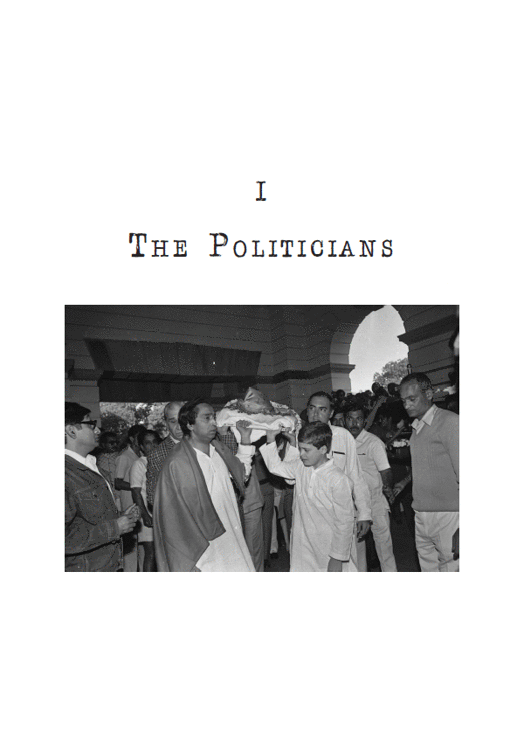
Could this be true? Would a Congress-I member of parliament (MP) show his hand, the party hand, so openly? Would he really come to claim men hauled up for attacking and looting Sikhs after the assassination of Prime Minister Indira Gandhi as the partys own? And then ask for them to be released?
It was an anonymous call, hard to believe. Politicians drop hints, they send word, they find ways of letting it be known what it is they want. It was hard to imagine an MP turning up in person at a police station to make such a demand.
But that wasnt the only bit hard to believe. Could it be that the police somewhere had actually taken steps against the hordes of men who had attacked, looted and killed Sikhs on the streets of Delhi? We had seen, I had seen myself, the police deliberately do nothing to protect Sikhs through the violence that arose after Mrs Gandhis death. In those days, for the police to arrest such criminals would itself be news.
The man had spoken with great urgency; his tone rang true. My gut feeling was that this information needed to be checked out. In the business of reporting you learn to make room for what is neither likely nor logical. What sounded more unlikely was an indiscretion by a Congress leader in publicly claiming ownership of men arrested for criminal acts, and not the fact that ruling party men had engaged in violence, with the backing if not leadership of their seniors.
I had run into killers just a couple of days earlier on the streets of Sultanpuri in west Delhi. Their Congress connections seemed evident. Through the worst of the killing in days earlier we had all witnessed a collapse of the ruling Congress government and its agencies. The government had emphatically failed to protect Sikhs, at the political level through its decisions and indecisions, and at the administrative level through the inaction of the police. But no Congress leader had publicly gone so far as what the caller was now claiming.
No doubt the caller had his interests. That would not be unusual newsrooms do get information as a matter of course only because it suits someone to pass it on. A beat crime reporter makes it his business to invite such information discreetly. The caller could have been from an opposition party, he could have been a concerned citizen, a do-gooder from within the Congress, someone who wanted to nail the MP, someone within the police. I didnt know and it didnt matter. The question was whether this was worth checking out.
A couple of us in the newsroom, and there were just a couple of us around at that time, were dismissive of the tip-off. None of us thought it likely that a Congress MP would go to a police station with such a demand, even if it were his men who had been taken in. But a fellow reporter I spoke with agreed that the scenario would be quite extraordinary if true. Could this be the chink through which the hand of the Congress leadership might become visible?
I had no immediate word of any new violence in the city at that time. It was 5 November. By then, the killing was done. So I took my old Vespa scooter and headed out to Karol Bagh police station.
I could hardly have suspected then that this expedition would lead to just about the firmest evidence I ever would see of the involvement of Congress-I leadersalong with top police officersin the looting and the killing that came with it. It led, in fact, to the most direct evidence so far of the partys involvement at such a senior level that Ive seen anywhere yet. Nor could I have anticipated that the visit to the police station would lead further to an encounter over the incident with the prime minister, Rajiv Gandhiand later bring me up against the defence of the Congress offered by his son Rahul ahead of the parliamentary elections in 2014.
Font size:
Interval:
Bookmark:
Similar books «1984: The Anti-Sikh Riots and After»
Look at similar books to 1984: The Anti-Sikh Riots and After. We have selected literature similar in name and meaning in the hope of providing readers with more options to find new, interesting, not yet read works.
Discussion, reviews of the book 1984: The Anti-Sikh Riots and After and just readers' own opinions. Leave your comments, write what you think about the work, its meaning or the main characters. Specify what exactly you liked and what you didn't like, and why you think so.

